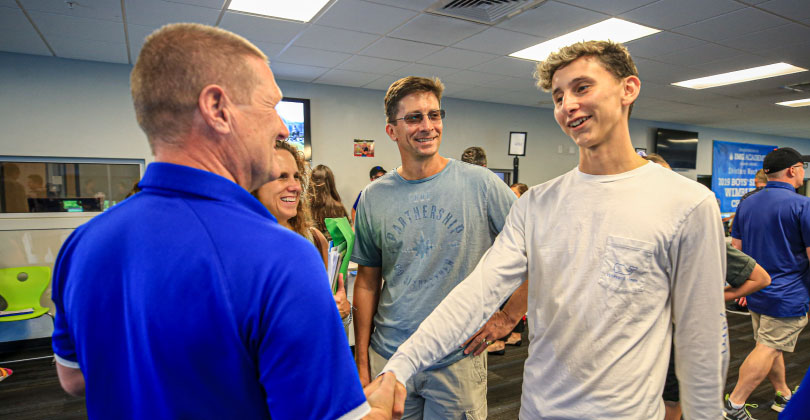If you’re a parent of a junior athlete who’s looking to play college sports, you’ve come to the right place! Junior year is a pivotal time in the recruiting process, and in this article, you’ll learn how to best support them through it.
We know how much you want your athlete to succeed, so we’re here to share our best tips and strategies to help you make it all happen. We even created a downloadable checklist to serve as a helpful reminder of what you can do to help your athlete during their junior year.
So, get ready for a winning season as we guide you through the ins and outs of junior year recruiting. Together, we’ll navigate this journey and make you the MVP (Most Valuable Parent) in your athlete’s success story.
Why junior year is the biggest year in college recruiting
Junior year is a pivotal time for athletes looking to play college sports. Here’s why:
- D1 coaches can contact your athlete: D1 college coaches are permitted to directly reach out to potential student-athletes. Current NCAA recruiting rules prohibit all phone, text and email communication between athletes or their families and Division 1 coaches until June 15 after their sophomore year or September 1 of their junior year, depending on the sport. This presents an opportunity for athletes to establish connections, express their interest and gain valuable insights into the recruitment process. Actively engaging with coaches during this time can greatly increase the chances of being recruited.
- Academics matter for admissions: College athletics programs value student-athletes who excel both in sports and academics. Junior year offers a chance to solidify academic records, as admissions committees closely examine an athlete’s performance. They consider factors like GPA, standardized test scores, and the overall rigor of courses. Strong academic performance during junior year enhances eligibility for athletic scholarships and admission to competitive colleges.
- Exposure through camps and events: Junior year presents numerous opportunities for athletes to showcase their skills in camps, showcases, and tournaments. College coaches and recruiters often attend these events, providing athletes with valuable exposure. Standing out and delivering exceptional performances among their peers can significantly boost visibility and attract the attention of college coaches.
- College research and campus visits: Junior year is an ideal time for athletes to research potential colleges and universities that align with their athletic and academic goals. Thorough research helps identify schools with suitable athletic programs and academic interests. Additionally, scheduling campus visits during junior year provides a firsthand experience of the college environment, interaction with coaches, and insights into the available facilities and resources for athletes.
Is it too late for athletes to get recruited if they haven’t started the process until junior year?
No, it’s not too late for athletes to get recruited if they haven’t started the process until junior year. While starting earlier can provide more opportunities, junior year still offers ample time for athletes to showcase their abilities, connect with coaches, and get recruited successfully. With dedication, proactive efforts, and a strategic approach, athletes can attract attention from college coaches and pursue their dreams of playing college sports.
Junior year recruiting is a team effort
When it comes to junior year recruiting, it’s all hands-on deck, and that includes both parents and athletes. This is a crucial time for your athlete’s future, so it’s important to work together as a team. While it may be difficult to loosen the reins and let your athlete take charge, remember that they need to own this process. Your role as a parent is to be their biggest supporter and guide.
Curious about the experiences of recently recruited athletes and their parents? We interviewed Hiram Alexander and Jasmine Chen, asking for their advice to parents of student-athletes in the recruiting process. Here’s what they shared.
Hear advice from Hiram Alexander, D2 Basketball Player:

Hear advice from Jasmine Chen, D1 Golfer:

How to support your athlete during junior year
Parents, your guidance and encouragement will help your athlete achieve their college sports dreams. Here are four ways to support them in the recruiting process:
- Have honest conversations: Sit down and talk openly with your athlete about their goals, interests and what they want from college. Support their college sports dreams and give them guidance as they figure things out.
- Let them lead: Encourage your athlete to take charge of the recruiting process. Tell them that they need to be the ones reaching out to coaches, asking questions and making decisions that match their goals – you’ll be there for support! This will help them build confidence and take ownership of their future.
- Be there emotionally: The recruiting process can be a real roller coaster of a ride. Show up for your athlete and remind them that their worth goes far beyond just sports. Above all, let them know how much you love them and be the person they can always rely on for support.
- Be upfront about college costs: Don’t shy away from money talk. It’s important for your athlete to fully understand the value and commitment of playing college sports. Work together to come up with a plan that aligns with your family’s budget and explore potential financial assistance options, such as scholarships, loans and financial aid.
How can I help my athlete balance the demands of the recruiting process during junior year?
It’s important to encourage effective time management skills and maintain open communication to help your athlete find balance during the recruiting process. A lot goes on and it can really take a toll on them – mentally and physically. By making their well-being a priority, you can offer the support they need to take care of themselves during this journey.
How can I help my athlete prepare for coach communication during their junior year?
To help your athlete prepare for coach communication during their junior year, focus on building their communication skills. Whether it’s writing emails to coaches, creating resumes or practicing coach interviews, you can help them gain confidence in their own abilities.
Here are 4 tips to help your athlete become a great communicator:
- Help your athlete have a clear understanding of their goals and interests.
- Research the coaches they will be communicating with to understand their coaching style, team philosophy and program expectations.
- Assist in creating a list of important questions for your athlete to ask coaches, covering topics like playing time, team culture, academic support and the recruitment timeline.
- Encourage active listening during coach conversations, emphasizing the importance of taking notes and showing genuine interest.
NCSA’s Parent Checklist for Junior Year
To help you stay on top of everything during your athlete’s junior year, we’ve created a downloadable checklist just for you. This practical resource is packed with actionable steps and strategies to assist you in providing the best support for your athlete during this pivotal time in recruiting.
- Support your athlete in creating and updating their NCSA profile regularly.
- This will help boost your athlete’s visibility to college coaches in the network and provide accurate information for evaluation.
- Enroll in an informative workshop.
- Gain valuable recruiting insights, trends and strategies to make informed decisions throughout the recruiting process for you and your athlete.
- Assist your athlete in researching schools and athletic programs.
- Discover colleges that align with your athlete’s interests and goals, providing a supportive environment to pursue their academic and athletic dreams.
- Stay informed about NCAA recruiting rules.
- Stay updated on important dates and deadlines in the D1 and D2 Recruiting Calendars to avoid any eligibility issues.
- Keep track of NCAA eligibility requirements.
- Encourage your athlete to have regular meetings with their high school guidance counselor and get registered with the NCAA to keep them eligible for college sports.
- Keep in mind that by the end of junior year, they need to have completed 10 core courses.
- Get your athlete ready to communicate with college coaches.
- During junior year, D1 coaches can start privately reaching out to recruits through emails, phone calls, texts and social media DMs.
- Help them prepare by assisting them in developing communication skills, suggesting questions to ask and practicing conversations, so they can feel confident and make a positive first impression.
- Go on college visits with your athlete.
- Join them on unofficial and official visits to meet coaches, explore campuses and get a feel for the potential team.
- Your presence offers them support and allows you to ask important questions during the visit.
- Help your athlete create a game plan for the ACT and SAT.
- Access study materials, practice exams, and expert guidance from our partner, Revolution Test Prep to help improve their test performance and reach their target scores. While the NCAA no longer requires these scores for eligibility, many colleges and universities require them for admission.
- Create a camp schedule with your athlete.
- Taking your athlete to college camps, showcases, and tournaments helps them develop skills and gain exposure to college coaches.
- By actively participating in these events, you demonstrate your commitment to their goals and recruiting journey.
- Explore scholarship and financial aid opportunities.
- FAFSA4caster: Estimate your athlete’s eligibility for federal student aid, providing insights into potential funding from the U.S. Department of Education.
- SMARTTRACK® College Funding: NCSA’s collaboration with SMARTTRACK® empowers families to maximize eligibility for college grants, scholarships and financial aid to cover college expenses.
- Unlock your athlete’s full potential with IMG Academy+ Coaching.
- Give your athlete the guidance and resources they need to excel. From mental performance training to personalized nutrition plans, IMG Academy+ empowers your athlete to reach new heights in their athletic journey.
- NCSA MVP Members have the advantage of accessing IMG Academy+ workshops. These workshops provide valuable tools and support for your athlete to enhance their performance, achieve their goals and unlock their full potential.
- Encourage your athlete to actively participate in extracurricular activities, take on leadership roles and engage with their community.
- Active involvement in these activities can significantly enhance their personal statements and college applications.
- These experiences highlight their well-rounded qualities to college coaches, as well as demonstrate coachability and their dedication to personal growth.
Download NCSA’s Parent Checklist for Junior Year >>
Conclusion: You can do this!
Junior year is an exciting and memorable time for your athlete. It’s a rollercoaster ride of ups and downs, but it’s these experiences that shape your athlete’s journey and make it truly special! By working together, keeping the lines of communication open and tapping into the support and parent resources provided by NCSA, you’ll have everything you need to confidently navigate the recruiting process. Here’s to an amazing junior year!
Get started on your recruiting journey. Create a free profile today!

